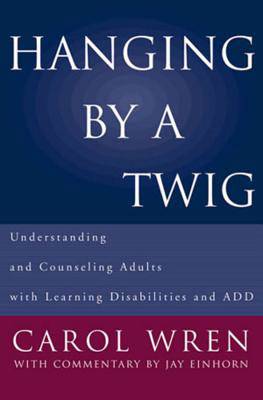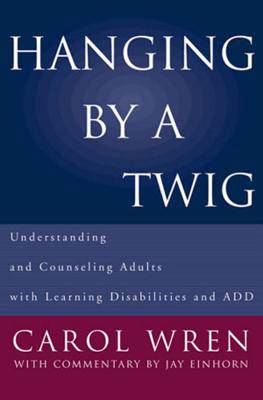
- Afhalen na 1 uur in een winkel met voorraad
- Gratis thuislevering in België vanaf € 30
- Ruim aanbod met 7 miljoen producten
- Afhalen na 1 uur in een winkel met voorraad
- Gratis thuislevering in België vanaf € 30
- Ruim aanbod met 7 miljoen producten
Zoeken
Hanging by a Twig
Understanding and Counseling Adults with Learning Disabilities and Add
Jay Einhorn, Carol T Wren
€ 32,45
+ 64 punten
Omschrijving
Carol Wren shares compelling stories of adults with LD and ADD, whose own words reveal their anger, depression, and anxiety as they struggle to succeed in work and life. Listen, for instance, to Mary, whose metaphor provides the title of the book: 'In America the philosophy is you've got to do better. Inside, though, there is that fearing, because of that 'Yes, you can, yes, you can.' And you're afraid that you're falling off a ledge on the side of a canyon and you're hanging on to a twig.'
Cognitive and emotional issues often interact in very subtle ways and can affect the LD client's perception, communication, self-esteem, and personality development. These interactions have powerful external consequences as well, including strained family relationships, poor work histories, and the inability to 'read' people and form friendships. LD and ADD can also keep clients from participating meaningfully in talk therapy. Wren's framework encourages readers to listen for LD and ADD in their adult clients.
Successful treatment begins with the psychotherapist's ability to understand a client's experiential world and establish an emotionally healing relationship based on that understanding. Wren's framework of personal stories and information about learning disabilities highlights this experiential world and shows professional readers how to listen for LD and ADD in their adult clients. Jay Einhorn's psychotherapeutic commentary adds specific guidance on treatment, so therapists can recognize their LD clients' cognitive limitations and their compensatory ways of dealing with the world.
People with learning disabilities have complex problems that are often neglected, misdiagnosed, or simply unrecognized. Hanging by a Twig gives psychotherapists and counselors a lens to see beyond the disability and help clients frame more productive, satisfying lives
Cognitive and emotional issues often interact in very subtle ways and can affect the LD client's perception, communication, self-esteem, and personality development. These interactions have powerful external consequences as well, including strained family relationships, poor work histories, and the inability to 'read' people and form friendships. LD and ADD can also keep clients from participating meaningfully in talk therapy. Wren's framework encourages readers to listen for LD and ADD in their adult clients.
Successful treatment begins with the psychotherapist's ability to understand a client's experiential world and establish an emotionally healing relationship based on that understanding. Wren's framework of personal stories and information about learning disabilities highlights this experiential world and shows professional readers how to listen for LD and ADD in their adult clients. Jay Einhorn's psychotherapeutic commentary adds specific guidance on treatment, so therapists can recognize their LD clients' cognitive limitations and their compensatory ways of dealing with the world.
People with learning disabilities have complex problems that are often neglected, misdiagnosed, or simply unrecognized. Hanging by a Twig gives psychotherapists and counselors a lens to see beyond the disability and help clients frame more productive, satisfying lives
Specificaties
Betrokkenen
- Auteur(s):
- Uitgeverij:
Inhoud
- Aantal bladzijden:
- 240
- Taal:
- Engels
- Reeks:
Eigenschappen
- Productcode (EAN):
- 9780393703153
- Verschijningsdatum:
- 17/02/2000
- Uitvoering:
- Hardcover
- Formaat:
- Genaaid
- Afmetingen:
- 163 mm x 243 mm
- Gewicht:
- 498 g

Alleen bij Standaard Boekhandel
+ 64 punten op je klantenkaart van Standaard Boekhandel
Beoordelingen
We publiceren alleen reviews die voldoen aan de voorwaarden voor reviews. Bekijk onze voorwaarden voor reviews.











